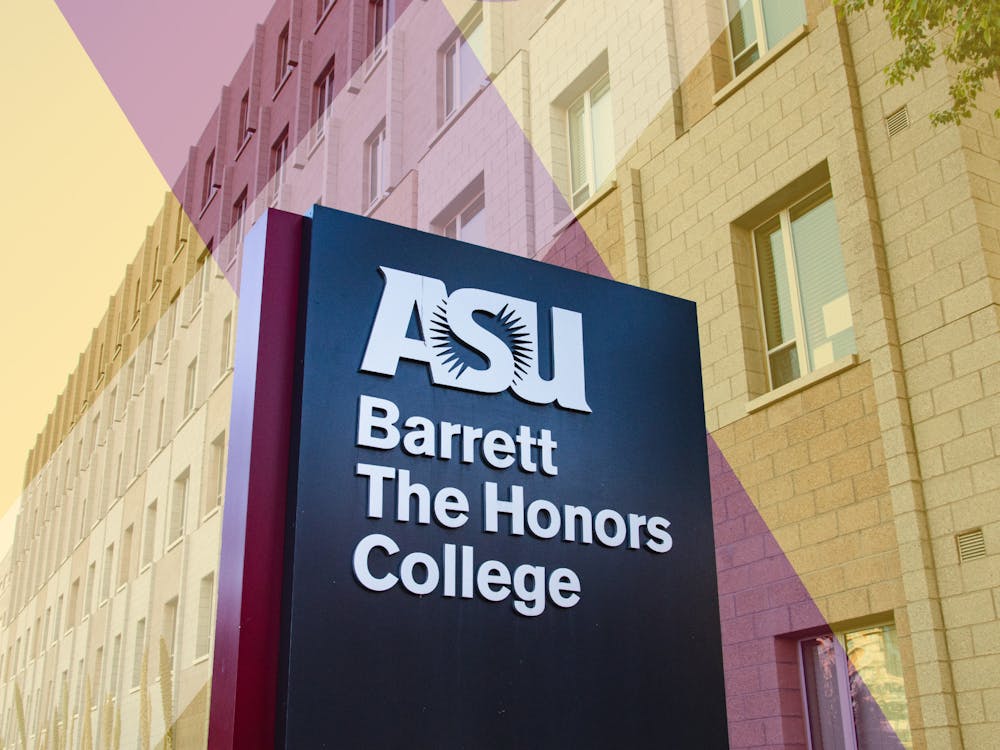To many Sun Devils and future students, Barrett, The Honors College may seem like just an advertisement in a pamphlet — a mysterious ASU gimmick only really understood by the select students enrolled in it.
On its website, Barrett touts itself as a “community of scholars at all four of ASU’s metropolitan Phoenix area campuses” that is “designed to complement your overall ASU experience by providing additional opportunities within your major or the university at large.”
But what The Honors College actually is may still be unclear to those outside Barrett.
According to its website, Barrett offers its students access to over 600 “honors academic experiences” each semester — including the yearlong set of foundational courses called The Human Event — special topics courses on subjects in which Barrett faculty specialize and exclusive study abroad opportunities.
While some students have embraced Barrett’s curricula, not all students have had the same experiences. For the students in Barrett who enjoy the variety of courses and experiences offered by The Honors College, there are also students who dislike the price they must pay for these exclusive offerings — from a more demanding workload to higher expectations and weightier responsibilities.
Barrett’s history
According to faculty who have worked at Barrett for decades, The Honors College hailed from relatively humble beginnings — given that it’s now an academic behemoth encompassing thousands of students and dozens of faculty.
“When I first came here in 1992, I became the third...of a three-person faculty,” said Michael Stanford, an Honors Faculty Fellow and professor at Barrett. “The student body couldn’t have been more than six or seven hundred.”
“We were tiny,” said Jacquie Lynch, another Honors Faculty Fellow and Barrett professor. “When I started in 2001, we had under 2,000 students, as opposed to our almost 8,000 now. (Among) the faculty, when I joined it, there (were) maybe seven of us.”
Established in 1988, Barrett has now grown to house over 7,200 students and a community of more than 20,000 alumni. It employs 135 faculty and staff members, with nearly 60% of them working full time.
Although the college came from simple beginnings, it was then that much of the foundation of the core Barrett experience was developed.
“In some ways, it’s very much like it is now,” Stanford said. “We had a course called The Human Event, which was required of all freshmen, and it was basically a Great Ideas course modeled on the kind of similar courses at some of the best private universities — Chicago, Stanford, Columbia.”
But Barrett still needed to grow to better fulfill its own and the University’s missions, according to Lynch.
“(Growth) went hand in hand with ASU’s charter for inclusivity, and so we wanted to make (Barrett) available to a lot more students,” she said.
Despite Barrett requiring its students to take The Human Event sequence, some faculty members still felt its curriculum lacked educational depth for an honors college. But change would come — in the form of a mandate from ASU President Michael Crow.
Barrett grows
“When Michael Crow gave us a mandate to grow The Honors College to 10% of the undergraduate class, we hired a lot more people and got a lot more resources that way,” Lynch said. “It was an explosion of growth.”
The order — which sought to have 1,600 incoming first-year students enrolled in Barrett on the Tempe campus by fall 2015, according to Nicole Greason, director of marketing and public relations for Barrett — led to a variety of impactful changes.
One involved the creation of a faculty mentoring program, which is in place to this day. In the program, Honors College faculty participate in a two-year training period, during which they visit other Barrett professors’ classes and give each other feedback, according to Lynch.
“It’s why I can be teaching some of the same classes 22 years later with the same enthusiasm,” she said. “(Class curricula are) always changing, and we’re always learning from each other.”
In addition, Barrett grew and diversified its student base. Initially, the college was mostly filled with English and philosophy students, according to Lynch.
“Now the pendulum has swung to the point where we have very high percentages of STEM and business students who wouldn’t necessarily otherwise get the kind of interdisciplinary studies that the honors curriculum offers,” she said.
Course curricula also became more diverse once many Barrett professors introduced non-Western texts to their classes in an effort to teach students about key ideas from civilizations worldwide, as opposed to just Western civilizations.
“It’s more stimulating to me because I get to read more widely in a lot of different cultures, rather than restrict myself and my students to reading (Western books),” Stanford said. “I would say that we’ve advanced, we moved on, we’ve progressed.”
Recently, Barrett has focused its expansion efforts on online education. In fall 2021, Barrett launched its online program, which welcomed its first student cohort.
Benjamin Fong, a Barrett professor teaching online sections, said the program has since “gone swimmingly.” The level of student engagement he observed in his online classes surprised him, given the time zone differences that divided his students. Currently, he teaches a class from 6–8:45 p.m. MST, and some students in the class live on the East Coast.
“One would expect the kind of situation that by the end of the seminar, students are kind of checked out a little bit...It’s extremely late on the East Coast,” Fong said. “But I just haven’t experienced that at all — my students stay engaged throughout the seminar until the very end, and oftentimes, they want to go over.”
Honorable devils
Barrett’s unique curriculum has elicited mixed reactions from students enrolled in the college — from wholehearted enthusiasm to lukewarm ambivalence to outright opposition.
Some students, like Hannah Lennon, a sophomore majoring in global studies, have thrived as a result of the courses, experiences and academic environments offered by Barrett.
“It’s been incredible — to be surrounded by such a motivated and inspiring group of students has really impacted my college career,” she said. “Every day I go to class, and I see my fellow peers in Barrett, and they just inspire me in so many ways because they’re so dedicated to their studies and really wanting to make a difference in this world.”
For Lennon, Barrett’s approach to learning helped her develop important academic and professional skills. The Human Event, which was one of her favorite classes she’s taken, was invaluable to her educational experience at the University.
“We read literature that involves science and philosophy and history and culture and religion,” Lennon said. “And you’re presenting that information to a group of students coming from various majors — you synthesize that information, you come to conclusions, you make arguments. I ultimately feel like that embodies what...Barrett inspires out of their students.”
With aspirations to one day work in health care, she found Barrett’s interdisciplinary studies have primed her to be a more understanding and flexible provider.
“I recognize the importance of the learning process and considering other perspectives — challenging what I know to be true — in order to make myself a better health care provider,” Lennon said.
For other students, like Sarah Brown, a junior majoring in film, being a part of Barrett has harmed their educational experiences more than it’s enriched them.
Brown said she dropped out of Barrett at the end of her freshman year due to stress from classes and anxiety about the required honors thesis. According to Brown, she struggled as a freshman to keep up with the additional workload Barrett brings to students’ plates.
“We had to do three rough drafts and three argumentative essays...that were between five to seven pages each,” Brown said. “I felt like that was just a lot to introduce everyone in The Honors College to.
“I probably would have stayed if that was something I could do more later on in my college experience, rather than just the beginning of my freshman year.”
In addition, she felt daunted by the expectations she felt were set for her as a Barrett student and the way faculty responded to a situation in which she was reprimanded. Brown and her friends had gotten in trouble in Gordon Commons during her freshman year, and when meeting with Barrett faculty about the incident, she said she felt “intimidated.”
“(T)hey said something along the lines of how being in (B)arrett meant we had to uphold more reputation and we had more to lose in a sense,” Brown wrote in a message.
Despite these negative experiences, she said she does regret leaving Barrett.
“I know it would be better for my resume to say that I was in The Honors College for more than a year,” Brown said. “It’d be better for me careerwise and academically.”
Furthermore, Brown recommended that new students stressed with the heavier workload Barrett brings should work to push through it as best they can, rather than leave the college entirely.
“Once you get past the hard parts in the beginning, it should go more smoothly from there,” she said. “I wish I had stuck through it and just tried to get all my work done then because now, I do have regrets about it.”
Other students, like Jace Clark, a senior majoring in computer information systems and supply chain management, harbor mixed feelings about their time in Barrett. While Clark has had doubts about Barrett, ultimately, he said he is thankful he decided to remain in the program.
“There was a time for a while where I was like, ‘The thesis is gonna be too much for me. I might drop it,’” Clark said. “But I figured it was probably worthwhile to just stick it out regardless, and the thesis wasn’t nearly as bad as I thought.”
Through all his doubts, what he said kept him in Barrett was his experiences with the honors faculty.
“I think (the) Barrett faculty are all really nice — they’ve helped me when I’ve had issues,” he said.
Through the years, Barrett has undergone dramatic change, and it’s certain to evolve even more in the future. But through it all, what Barrett itself means has also shifted from student to student — the Barrett experience is fluid, amorphous and in constant flux, defined by the students themselves.
Edited by Camila Pedrosa, Savannah Dagupion and Madeline Nguyen
This story is part of The Element Issue, which was released on Nov. 1, 2023. See the entire publication here.
Reach the reporter at swmcgee@asu.edu and follow @swmcgeemedia on X.
Like State Press Magazine on Facebook, follow @statepressmag on X and Instagram and read our releases on Issuu.




